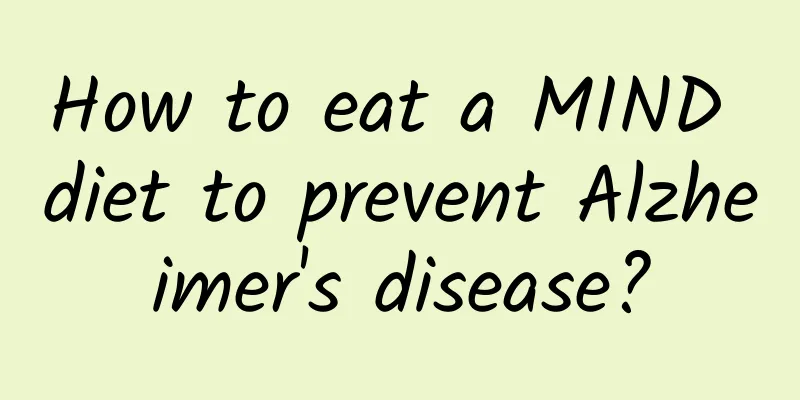How to eat a MIND diet to prevent Alzheimer's disease?

|
Today is September 21, World Alzheimer's Day, which is commonly known as senile dementia. As the number of elderly people in my country increases, the prevalence of Alzheimer's disease is also increasing year by year. According to a report by the China Association of Geriatrics and Geriatrics, there were approximately 15.07 million Alzheimer's disease patients aged 60 and above in my country in 2020, and it is expected to reach 22.2 million in 2030. Alzheimer's disease is currently the fourth leading cause of death among the elderly, following cancer, heart disease and cerebrovascular disease, and is also a disease that is highly correlated with age. The larger the number of elderly people, the greater the proportion of those suffering from Alzheimer's disease. It is estimated that around 2035, my country's elderly population aged 60 and above will exceed 400 million, accounting for more than 30% of the total population, entering a stage of severe aging. Therefore, it is urgent to prevent Alzheimer's disease. How to prevent Alzheimer's disease in life? This article will talk about diet to help prevent the disease. 1. Risk factors for Alzheimer's disease ▲Photo: Photo Network Alzheimer's disease is a neurodegenerative disease. Although it is closely related to age, unhealthy daily living habits will further promote the onset of the disease. ① High-salt diet: According to the latest research, a high-salt diet may impair certain cognitive functions of the brain. Long-term high salt intake will lead to increased oxidative stress in the hippocampus and inflammatory responses from the intestines, impairing memory, especially for the elderly. In addition, even if there is no abnormality in blood pressure at present, if you continue to eat a high-salt diet, it will also damage cognitive function. In addition, the occurrence of Alzheimer's disease is closely related to blood pressure. Many studies have shown that high blood pressure can increase the risk of mild cognitive impairment turning into dementia. And high blood pressure can also induce stroke, which is also a risk factor for Alzheimer's disease. It is recommended to follow the recommendations of the "Dietary Guidelines for Chinese Residents" and the World Health Organization and control daily salt intake to less than 5 grams. ② High GI diet: Many studies have found that blood sugar levels are related to impaired cognitive ability. Elevated blood sugar levels can damage brain function, reduce cognitive function, and increase the risk of Alzheimer's disease. It is an independent risk factor for Alzheimer's disease. For people with type 2 diabetes, the risk of Alzheimer's disease will increase by 1.5 times. A high GI diet will increase the risk of dysglycemia and diabetes. It is recommended to combine coarse and fine staple foods, avoid eating too much refined white rice and noodles, and eat less foods containing added sugar, such as white sugar, honey, brown sugar, fructose, high fructose corn syrup, etc. ③ High cholesterol diet: Cholesterol levels are closely related to the incidence of Alzheimer's disease. You should try to avoid consuming foods with high cholesterol content, such as fatty meat, squid, animal brains, and eat less offal. ④ High-fat diet: A high-fat diet can promote the occurrence of obesity, and the high fat content in obese people can easily induce inflammatory responses, which can damage the blood-brain barrier, impair the normal function of the brain, and ultimately increase the risk of Alzheimer's disease. Middle-aged obesity can double the risk of Alzheimer's disease. To determine whether you are obese, you can use: BMI = weight (kg) / height (m) squared It is recommended that young people control their BMI between 18.5 and 23.9 kg/m2, and it is recommended that the elderly control their BMI between 20 and 26.9 kg/m2. ⑤ Smoking: Most studies believe that smokers have a much higher risk of developing Alzheimer's disease than non-smokers, and quitting smoking can reduce the risk of Alzheimer's disease to a certain extent. Smoking has no benefits but only harms, so quit it as soon as possible. 2. These nutrients are related to Alzheimer's disease ▲Photo: Photo Network Although incorrect diet and lifestyle habits can increase the risk of Alzheimer's disease, adequate intake of certain nutrients in the diet can be very helpful in preventing Alzheimer's disease. ① DHA: DHA belongs to the n-3 series of unsaturated fatty acids, which is not only beneficial to the health of the nervous system, but also has anti-inflammatory effects. Eating fish is a direct and effective way to obtain DHA. Studies have also shown that people who eat fish regularly have a lower risk of Alzheimer's disease. ② Antioxidant ingredients: Vitamin E, folic acid, flavonoids and carotenoids have a delaying effect on brain aging. These substances are mostly found in fruits, especially green leafy vegetables and dark-colored fruits and vegetables. ③ Probiotics: Some studies have shown that changes in intestinal flora are related to neurological diseases, and an imbalance in intestinal flora may increase the risk of Alzheimer's disease. There are also animal experiments using probiotics to treat mice with Alzheimer's disease, and it was found that it can change the cognitive function of mice. Food can also provide us with probiotics. If we want to have a healthy intestine, we must have a balanced diet. 3. Dietary patterns to prevent Alzheimer's disease To prevent Alzheimer's disease, the MIND diet is recommended, which is a dietary pattern that can slow cognitive decline. It combines the Mediterranean diet with the DASH diet. Research results show that the MIND diet can significantly slow the decline of cognitive ability with age. Data show that the MIND diet reduces the risk of Alzheimer's disease by about 35% in people who follow it moderately, and by up to 53% in those who follow it strictly. So, how can we apply the MIND diet to our daily life? ▲Table: Made by myself In addition, in order to prevent Alzheimer's disease, in addition to following the MIND diet pattern, you should also pay attention to exercising more, because physical activity can increase brain capacity and reduce the risk of Alzheimer's disease. ▲Photo: Photo Network Summarize: As the aging of my country's population becomes increasingly serious, preventing Alzheimer's disease is an important step in ensuring the quality of life and safety of the elderly. Take care of the health of “old children” and start eating the MIND diet. References: [1] Wei Xiaxia, Hao Zhimei, Chen Ling, Wang Fenglan, Jing Liwei, Xing Fengmei. Analysis of the prevalence and related factors of Alzheimer's disease based on CHARLS 2018 data[J]. Modern Preventive Medicine, 2022, 49(07): 1327-1332. [2] Michael DK, Margaret JM. Reviewing the effects of dietary salt on cognition: mechanisms and future directions. Asia Pac J Clin Nutr, 2019, 28(1):6-14. [3] Wu Liping, Ding Mei, Hong Xiaotong, Huang Ting, Huang Rong. Research progress on risk factors of Alzheimer's disease[J]. Journal of Gannan Medical College, 2020, 40(04): 427-432. [4] Yang Yuexin, Ge Keyou. Chinese Nutrition Science Encyclopedia 2nd Edition (Volume 2)[M]. People's Medical Publishing House, 2019 [5]Martha Clare Morris, Christy C. Tangney, Yamin Wang, Frank M. Sacks, Lisa L. Barnes, David A. Bennett, Neelum T. Aggarwal, MIND diet slows cognitive decline with aging, Alzheimer's &Dementia, Volume 11, Issue 9, 2015, Pages 1015-1022 [6] Wang Zhiming, Zhou Qiang, Lu Shuhuan, Yu Chao, Xiao Min, Li Xiangyu. Efficacy of DHA in the prevention and adjuvant treatment of Alzheimer's disease[J]. Food Industry Science and Technology, 2014, 35(22): 397-400. DOI: 10.13386/j.issn1002-0306.2014.22.078. [7] Liu Yangyang, Liu Dandan, Yin Jie. Mechanisms of probiotics in preventing common geriatric diseases[J]. Journal of Food Safety and Quality, 2021, 12(03): 873-878. DOI: 10.19812/j.cnki.jfsq11-5956/ts.2021.03.006. [8]Morris MC, Tangney CC, Wang Y, Sacks FM, Barnes LL, Bennett DA, Aggarwal NT. MIND diet slows cognitive decline with aging. Alzheimers Dement. 2015 Sep;11(9):1015-22. doi: 10.1016/j.jalz.2015.04.011. Epub 2015 Jun 15. PMID: 26086182; PMCID: PMC4581900. [9]https://health.usnews.com/best-diet/mind-diet |
Recommend
What to do when you have constipation during your period
Menstruation actually has a great impact on women...
What causes sagging breasts during pregnancy?
Many women will find various changes in their bod...
What causes sleepiness in early pregnancy?
It is easy to feel sleepy in the early stages of ...
What can maintain the uterus?
We all know that women's greatest self-confid...
Will drinking alcohol after taking birth control pills affect their effectiveness?
Everyone knows that emergency contraception is a ...
Cervical erosion surgery fee
Nowadays, doctors rarely require patients to unde...
Can I eat spicy food when I have my period?
Diet is very important for human beings. If a per...
How to help cervical dilation for primiparas
For the first child, pregnant women should promot...
What anti-inflammatory medicine should I take for wisdom tooth inflammation?
What are wisdom teeth? Wisdom teeth can also be c...
The strong sun has not weakened for two days
A strong positive is the result detected by the o...
What are blackheads? What causes blackheads?
Blackheads are one of the main skin problems for ...
What are the methods for female ovarian maintenance?
The ovaries are very important for every woman, b...
What are the harms of two abortions to the body?
Nowadays, many girls go for abortions without bei...
Why is the vaginal discharge like jelly and elastic?
Why is it that the leucorrhea is very elastic whe...









